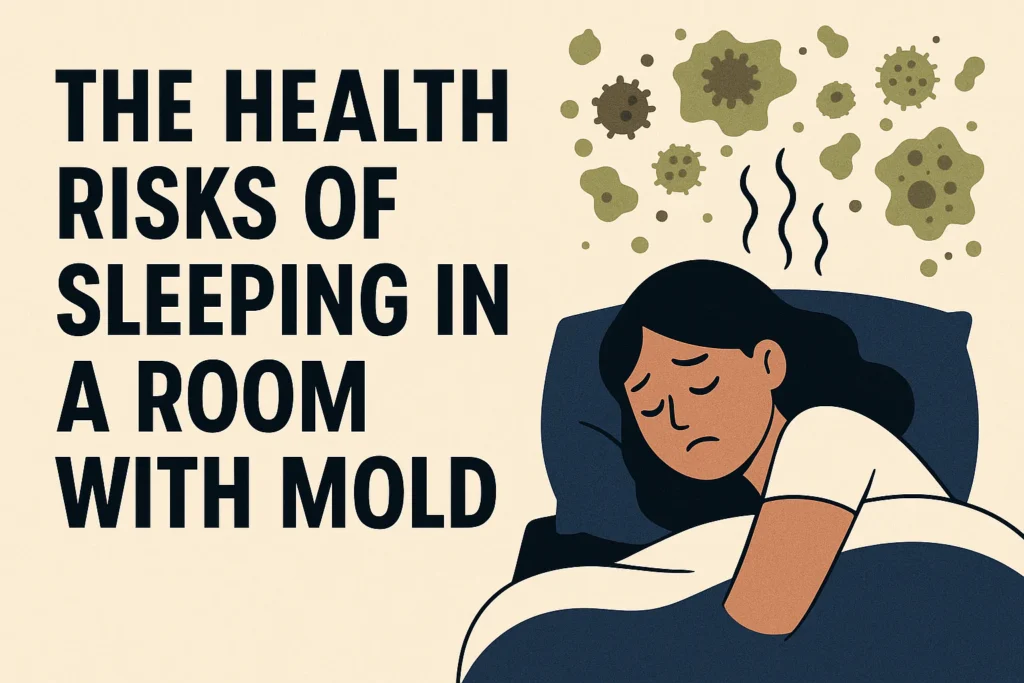Mold isn’t just gross looking—it’s actually bad for your health too. Especially when it’s in your bedroom. That’s the place where you’re supposed to rest and recover, but mold can mess with your body big time if you’re breathing it in all night. So if you’ve spotted mold or even just smelled something musty… don’t ignore it. Let’s break down why sleeping in a moldy room is risky and what you can do about it.
🤧 Common Symptoms of Mold Exposure
When you sleep in a room with mold, you’re breathing in tiny particles called spores. They can cause:
- Coughing and wheezing
- Sneezing and itchy eyes
- Skin rashes
- Headaches
- Feeling tired all the time
If you have asthma or allergies, mold can make things worse. And sometimes, people feel sick but don’t even realize mold is the cause.
😴 How Mold Affects Your Sleep
Mold in your bedroom can mess up your sleep without you even knowing it. It can cause:
- Trouble falling asleep
- Waking up a lot during the night
- Feeling exhausted even after 8 hours of sleep
If you’re tossing and turning or waking up sneezing, your bedroom might have a hidden mold problem.
🧠 Long-Term Health Consequences
Breathing in mold for a long time is not something to brush off. It can lead to:
- Memory problems
- Mood swings or feeling sad
- Weakened immune system
- Chronic breathing problems
And if it’s black mold (which is one of the worst kinds), it can be even more dangerous.
🕵️♀️ How to Spot Mold in Your Bedroom
Mold doesn’t always show up in obvious places. Look out for:
- Black, white, or green spots on walls or windows
- A damp or musty smell
- Condensation on windows
- Peeling paint or wallpaper
- You feel better when you leave the room
Check behind furniture, under carpets, or even in your closet. Mold hides where it’s damp and dark.
🛡️ How to Prevent Mold in Your Bedroom
Stopping mold before it starts is the best move. Here’s how to do that:
- Use a dehumidifier to keep the room dry
- Open windows or use a fan when showering or cooking
- Fix leaks fast—whether it’s your roof, pipe, or windows
- Clean regularly to keep spores from spreading
If your room smells weird or you notice any signs above, act fast before it spreads.
🧽 How to Clean Mold Safely
If you find mold in your bedroom, you might be able to clean it yourself if it’s small:
- Mix soap and water or vinegar and water
- Use gloves and a mask so you don’t breathe in the spores
- Scrub the moldy spot and dry it completely
⚠️ But if there’s a lot of mold, or it keeps coming back, it’s time to call in a pro. ERX can handle the big stuff safely and completely.
🏥 When to See a Doctor
If you’ve been feeling sick for no reason and you’ve got mold in your room, it’s a good idea to check in with your doctor. They can figure out if the mold is causing your symptoms and help you feel better.
🧠 FAQs
Q: Is it bad to sleep in a room with mold?
A: Yes. Even if you don’t see it, breathing in mold while you sleep can mess with your health and energy.
Q: Can mold in my bedroom make me tired all the time?
A: Absolutely. Mold affects your breathing and can cause poor sleep and constant fatigue.
Q: Will an air purifier help?
A: It can reduce spores in the air but it won’t get rid of mold growing on surfaces.
Q: How do I know if mold is hidden in my room?
A: If you notice a musty smell, feel sick in that room, or see peeling paint or damp spots—it might be mold.
Q: What should I do if I can’t clean the mold myself?
A: Call the pros at ERX. We’ve got the tools and training to handle it safely.
🚨 Need Help Right Now?
Mold isn’t something to wait on. If you think there’s mold in your bedroom—or anywhere else in your house—call ERX (Emergency Restoration Xperts) today.
📞 Call us at (866)-217-7903

